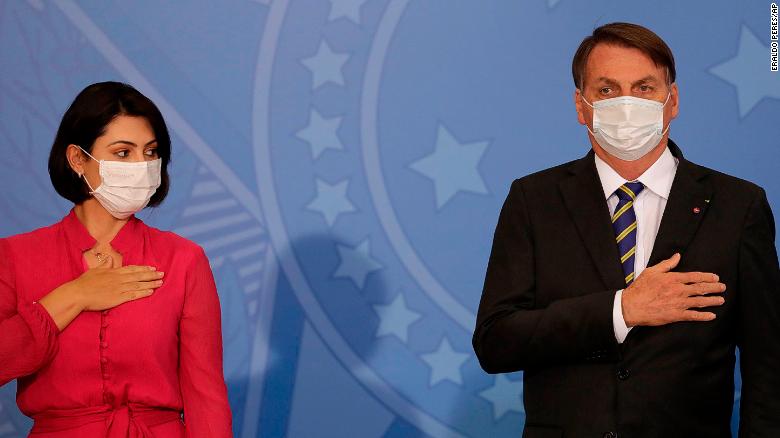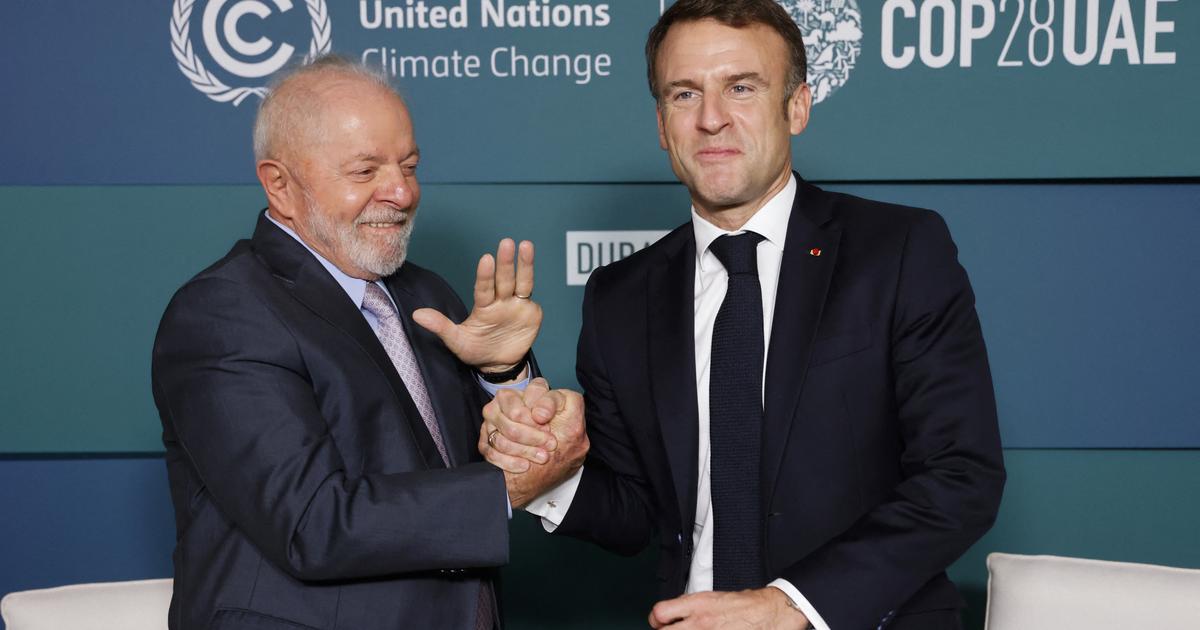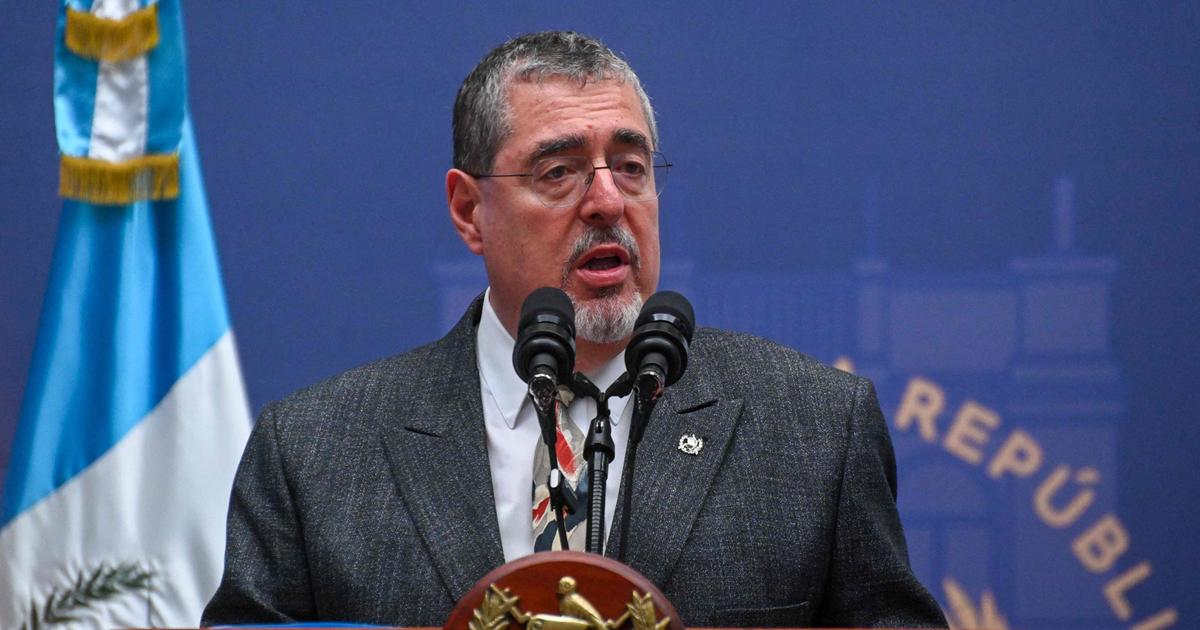More than 200,000 deaths from covid-19 in Latin America 1:28
(CNN) - Her husband made the headlines when she announced on July 7 that she had tested positive for covid-19. And on Thursday, Michelle Bolsonaro, wife of Brazilian President Jair Bolsonaro, also tested positive for the virus.
Across Latin America, new numbers of infections are skyrocketing even in the highest circles, a sign of how widespread the coronavirus has become and how ineffective many government efforts have been to stop it thus far.
So far, at least six senior government officials have tested positive for coronavirus in Brazil, the country with the second-highest number of confirmed cases and deaths worldwide after the United States. But it is not the only country in the region that has been devastated by the pandemic:
The President of Brazil, Jair Bolsonaro, and his wife Michelle.
More than a dozen officials, including the acting president, have tested positive for the coronavirus in Bolivia, which last week broke its own record for new coronavirus infections in a single day. Peru, Argentina and Colombia are trying to catch up with the growing numbers of cases with new quarantine orders. And on Friday, Mexico overtook the United Kingdom to become the country with the third highest number of deaths from covid-19 worldwide, according to data from Johns Hopkins University.
In Mexico City, Dr. Carlos Martínez Murillo, an emergency room doctor who works in the covid-19 room at the General Hospital of the capital, reflected on his new reality during the last five months, a reality that it has already claimed the lives of almost 600 health professionals in the country.
«I have not contracted the disease, but I have colleagues who have. As the weeks and months have passed, we have learned to manage stress. I'm not saying that fear has disappeared. The fear persists, but we have channeled it [to our work], ”said Dr. Martínez.
Colombia reported a new daily record of coronavirus cases after 10,673 new infections were recorded on Saturday, bringing the total to 306,181, its health ministry said. And although some cities with low infection rates may partially reopen, President Iván Duque had already extended his government's quarantine measures on Tuesday until August 30.
Considering the province of Buenos Aires, where the country's capital is located, "the epicenter of the problem", the President of Argentina, Alberto Fernández, announced on Friday that the current quarantine will last at least until August 16, "maintaining everything as it is today ”, because“ the virus circulates even more ”. Relative to the tests, the positivity rate increased from 22.4% to 26.2% in the last two weeks.
Carlos Lozada, Peru's Minister of Housing, Construction and Sanitation, told TV Peru on Friday that the Council of Ministers had decided to extend the country's state of emergency for another month, until August 31. Lozada said the decision was made after authorities reported growing cases in at least four regions, including Cusco, where Machu Picchu, Peru's biggest tourist attraction, is located.
The most affected region in the world
Latin America is undoubtedly "the region most affected in the world" by the pandemic, said Dr. Marcos Espinal, director of the Department of Communicable Diseases of the Pan American Health Organization (PAHO), in a recent interview with CNN.
Huge recession looming in Latin America 1:38"We are in a very critical situation. Brazil reported more than 40,000 new cases on Wednesday, Colombia more than 10,000 and Mexico more than 7,000. The next few weeks will be of great importance in terms of discovering how we can flatten the curve, "said Dr. Espinal.
He added that some countries that had some success at first, such as Chile, now have to redouble efforts due to factors that exacerbate the pandemic, such as working conditions, mobility and highly vulnerable populations.
«We have to remember that there is great inequality in Latin America and the Caribbean. There is a huge informal economy and it is more difficult to observe the rules of social distancing. A series of social, economic and public health challenges make it difficult to fight the disease [in Latin America], and therefore controlling the pandemic will take longer, "Espinal said.
In a televised message on Friday, the President of Argentina, Alberto Fernández, observed a worrying trend in his country that has also been observed in other Latin American nations: «In the month of May, we registered 375 deaths [related to covid-19]. In June, the number of people who died was 700. Twenty-four days later it increased to 1,500. And in the following 24 days it reached 3,000. That means that the number of deaths has doubled every 24 days, "said the president.
The collateral effects of the pandemic will surely have their own cost, warned a report published last week by the United Nations Economic Commission for Latin America and the Caribbean and the World Health Organization, which warned that "the pandemic has It has become an unprecedented economic and social crisis and, if urgent measures are not taken, it could become a food, humanitarian and political crisis. "
Measures to contain the pandemic, including social distancing, will lead to a 9% decrease in the region's gross domestic product and an increase in unemployment to 14%, he said.
And health systems, stretched to their limits by the increasing number of infections, have had to interrupt their efforts to contain chronic and non-communicable diseases, which "led to a significant increase in overall mortality, in addition to deaths caused by covid-19 ", adds the report.
Across the region, lines have been seen in hospitals, and a lack of resources and manpower has been a widespread concern for doctors. In the Dominican Republic, where authorities insist that the health system has not collapsed, some people must wait days to receive treatment for the coronavirus.
CNN found Eloísa Mieses, 71, at the Marcelino Vélez Santana Regional General Hospital in Santo Domingo, the capital of the Dominican Republic. She had to wait three days before being admitted for treatment with covid-19.
"I used to listen to people in my neighborhood who said that [the disease] did not exist, that they had not heard that something like this was real," Mieses said.
"But now, everyone is seeing that it is real."
Marcos Moreno reported from Rio de Janeiro, Ignacio Grimaldi reported from Buenos Aires, Rey Rodríguez reported from Mexico City and Jessica Hasbun reported from Santo Domingo.
Pandemic


/cloudfront-eu-central-1.images.arcpublishing.com/prisa/2C5HI6YHNFHDLJSBNWHOIAS2AE.jpeg)



/cloudfront-eu-central-1.images.arcpublishing.com/prisa/W33JSXVPKRF7FMDYEETPSPNNKY.jpg)
/cloudfront-eu-central-1.images.arcpublishing.com/prisa/2BJPLFOPENCKDMK6PPADXUU37E.jpg)
/cloudfront-eu-central-1.images.arcpublishing.com/prisa/IOQ5LVJEOFAEZHGFMYWVXLFURI.jpg)
